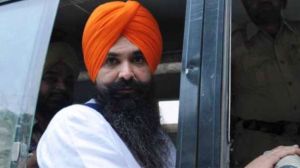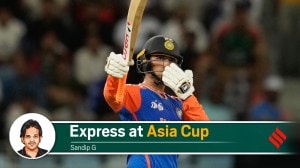 Islamabad: External Affairs Minister Sushma Swaraj with Pakistan Prime Minister Nawaz Sharif as Pakistan’s Foreign Affairs Adviser Sartaj Aziz looks on during the Ministerial Conference of Heart of Asia – Istanbul Process in Islamabad on Wednesday. (Source: PTI Photo)
Islamabad: External Affairs Minister Sushma Swaraj with Pakistan Prime Minister Nawaz Sharif as Pakistan’s Foreign Affairs Adviser Sartaj Aziz looks on during the Ministerial Conference of Heart of Asia – Istanbul Process in Islamabad on Wednesday. (Source: PTI Photo)
On Wednesday, Foreign Secretary S Jaishankar reiterated India’s commitment to its neighbours . “As far as India is concerned, we are pursuing with renewed vigour our ‘neighbourhood first’ policy which also translates into priority for our SAARC initiatives,” Jaishankar said at Pokhara in Nepal while addressing the 42nd meeting of the standing committee of the South Asian Association for Regional Cooperation (SAARC).
Pointing out that India was systematically pursuing the initiatives flagged by Prime Minister Narendra Modi at the last SAARC summit held in Kathmandu in November 2014, he added: “These are important not because they were made by India but because they have the potential to help us achieve our goal of greater connectivity and integration.”

Watch Video Ind & Pak Talks At SAARC Meet: Will There Be More Than The Usual Rhetoric?
Story continues below this ad
READ | SAARC meet: India to raise issue of Pathankot attack
[related-post]
Listening in the audience was Pakistan’s Foreign Secretary Aizaz Ahmad Chaudhry who had conversations with Jaishankar at dinner and then over omelettes at the breakfast table in the last 24 hours.
On Thursday, External Affairs Minister Sushma Swaraj will meet Pakistan PM’s adviser on foreign affairs Sartaj Aziz who will hand over Pakistan PM Nawaz Sharif’s invitation to Modi for the SAARC summit scheduled to be held there in November this year.
Swaraj and Aziz also had extensive conversations over dinner and breakfast. While no official word is out yet on these chats, it is clear that they will take the opportunity to exchange notes on the way forward for the two countries.
Story continues below this ad
The usual narrative expected to play out is the following: while India will insist on progress on the Pathankot terror attack, Pakistan will say that its internal agencies and systems are working towards that goal.
A timely tip-off from Pakistan’s NSA about a possible terror attack in India – the jury is still out whether it’s Gujarat or not Gujrat – has added a layer of trust to the scheme of things.
This parallel conversation between the NSAs has been the track used to rebuild the trust deficit between the two sides. And the careful briefing about the killing of three terrorists by India is being seen as one of the important steps taken to set the stage for a possible visit by Pakistan’s Special Investigation Team to India.
So, Swaraj and Aziz are expected to discuss these and other issues as they sit for a structured talk in the scenic city of Pokhara.
Story continues below this ad
Aziz will be meeting foreign ministers of all SAARC countries on the sidelines to extend formal invitations to their respective heads of government for the 19th SAARC Summit. But, with Swaraj, it is expected to go beyond the invitation.
The SAARC countries have been held hostage by India-Pak tensions. So, officials and ministers will be hoping that the opportunity for an India-Pak tete-a-tete will unlock the ties.
Only then, to quote Jaishankar, will building a peaceful, secure and prosperous neighbourhood yield rich dividends for all SAARC member states.

 Islamabad: External Affairs Minister Sushma Swaraj with Pakistan Prime Minister Nawaz Sharif as Pakistan’s Foreign Affairs Adviser Sartaj Aziz looks on during the Ministerial Conference of Heart of Asia – Istanbul Process in Islamabad on Wednesday. (Source: PTI Photo)
Islamabad: External Affairs Minister Sushma Swaraj with Pakistan Prime Minister Nawaz Sharif as Pakistan’s Foreign Affairs Adviser Sartaj Aziz looks on during the Ministerial Conference of Heart of Asia – Istanbul Process in Islamabad on Wednesday. (Source: PTI Photo)





































